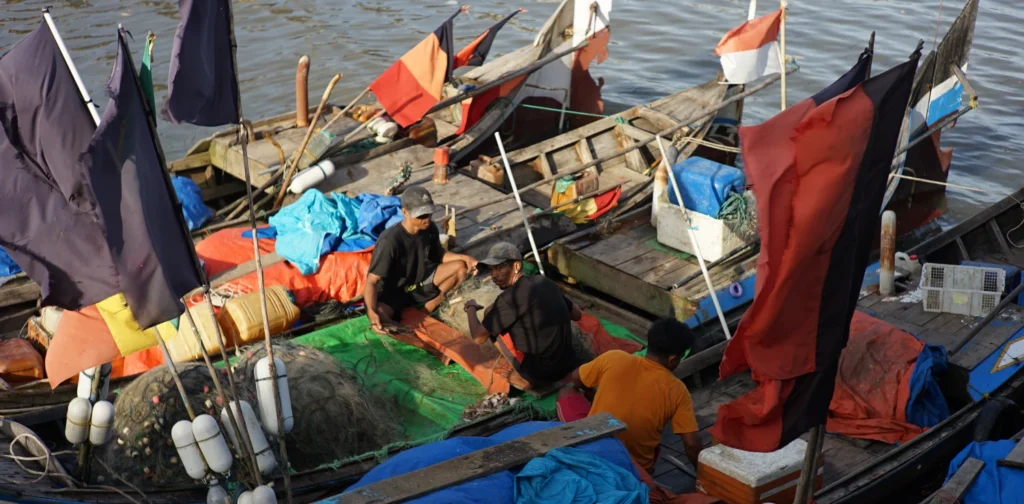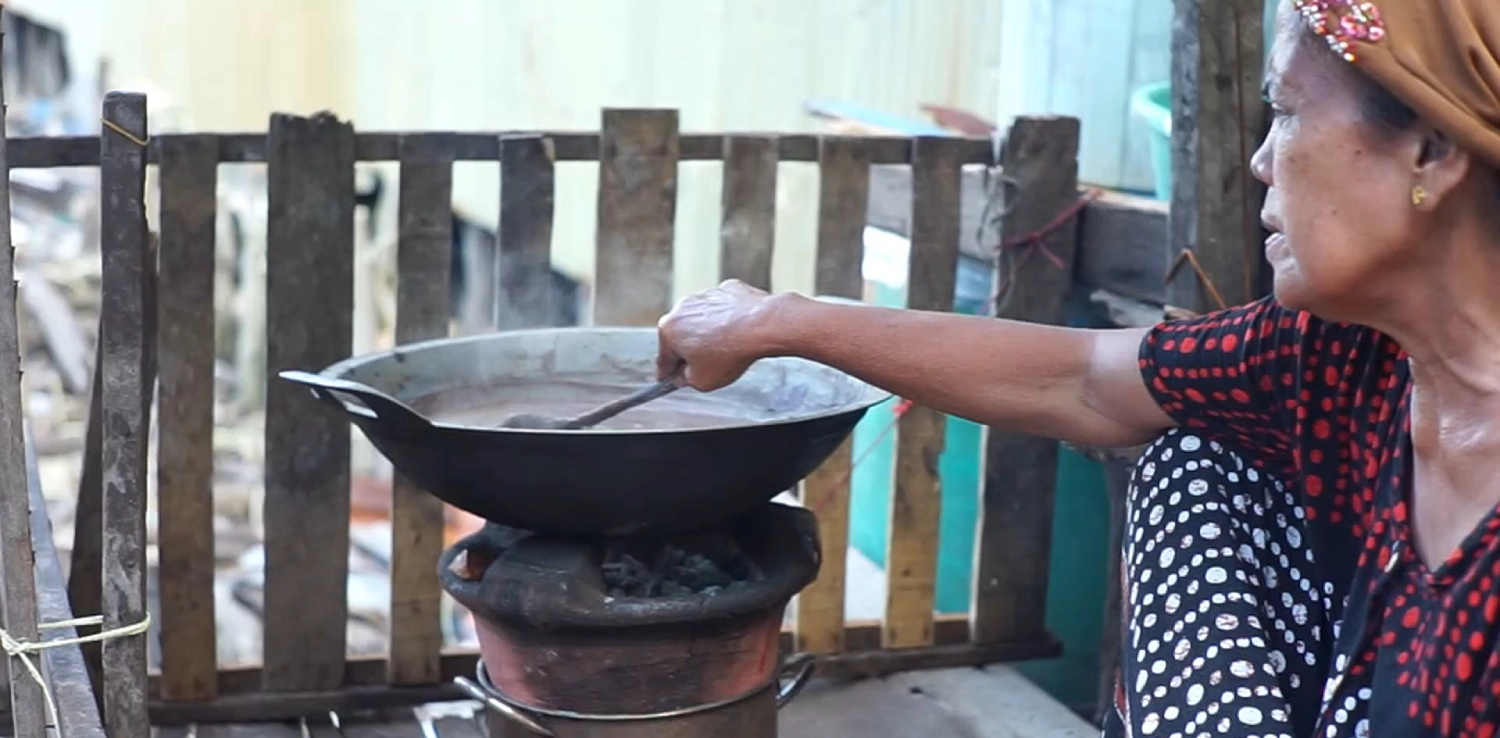The Plight of Fishermen in Sei Sembilang Village, Banyuasin, Amid Climate Change

Fishers at the coast of Sei Sembilang Village. | Photo: Dinar Try Akbar.
Across the globe, people are experiencing the impacts of climate change. Coastal communities worldwide are among the most vulnerable in the face of the accelerating crisis, including in Indonesia. The country has at least 1,511 villages located in coastal areas, where over 1.3 million people are living in poverty characterized by high levels of social, economic, and ecological vulnerability. This condition rings true for the residents and fishing community of Sei Sembilang Village. The village is on the eastern coast of Banyuasin, South Sumatra, within the Berbak Sembilang National Park area, a UNESCO-designated world biosphere reserve.
From observations and interviews with several local residents between May 16-18, 2025, I learned that Sei Sembilang fishermen are facing multiple pressures due to the impacts of climate change. Catch productivity is declining, while operating costs at sea and household expenses are increasing.
Climate Struggles in Sei Sembilang
Unpredictable weather and the increasing frequency of high waves and ocean currents have disturbed the lives of communities in Sei Sembilang Village and other villages along the Banyuasin coast. For the fishermen, current climate anomalies are difficult to understand based on their knowledge, leading to declining fishing productivity. The condition forces them to travel farther out to sea to reach fishing ground, spending twice as much on diesel fuel.
Beyond ecological impacts, climate change also has broader, compounding socio-economic implications. These impacts are felt most acutely by the women in the village. They struggle to manage their households, and also have to bear additional economic burdens when their husbands’ incomes decrease. This burden is further complicated by Sei Sembilang’s location in an outlying area with limited access to basic infrastructure such as education, health services, and clean water. The village itself has very limited economic opportunities; the majority of residents rely solely on their catch from the sea.
Furthermore, the area has weak electricity access from the national grid. Sei Sembilang residents have to rely heavily on privately owned diesel-powered power plants (PLTD). Each household must pay a monthly fee of 650,000 to 1.2 million IDR (approximately 10-72 USD) to power common electronic devices. This fee can increase depending on prevailing fuel prices.
Meanwhile, the state-run solar-powered power plant (PLTS) has yet to become the primary source of electricity for all households. It only reaches a few locations, such as mosques, literacy buildings, and village offices.
Efforts to Adapt & Hope for Improvements
Amidst all the difficulties and limitations, the Sei Sembilang communities are trying to adapt. A group of housewives, for example, is trying to make additional income by making processed fish and shrimp products. They make pempek (a type of fishcake made out of fish and tapioca) and terasi (shrimp paste for condiments). Gradually, their terasi products reach as far away as Bangka Belitung Island and Palembang City, through consignment with fishermen heading out to sea or via river transportation.

Meanwhile, the fishermen are not short of ideas either. When they cannot venture out to sea, they catch commodities such as crabs, clams, and shrimp in the mangrove areas along the Sembilang River. Then, they sell them for extra income and used to fulfill the household’s daily needs.
Despite their limitations, the coastal communities also participate in independent mangrove restoration efforts, fully aware that their livelihoods depend on the sustainability of coastal and marine ecosystems. They also process organic waste into compost to support their vegetable gardens, whose yields meet their needs. However, even though they can adapt to these difficulties, the communities still need systemic and responsive support to climate change so they can not only survive but also enjoy a better and more prosperous life.
“The people in our village are still trying to survive. Several initiatives, such as self-help mangrove restoration and training in seafood processing, have been initiated as economic alternatives. We hope that the government will address the basic needs of our hamlet residents, such as electricity, health care, and education,” said Monik, Head of Sei Sembilang Village.
Editor: Abul Muamar & Nazalea Kusuma
Translator: Kresentia Madina
The original version of this article is published in Indonesian at Green Network Asia – Indonesia.

Co-create positive impact for people and the planet.
Amidst today’s increasingly complex global challenges, equipping yourself, team, and communities with interdisciplinary and cross-sectoral insights on sustainability-related issues and sustainable development is no longer optional — it is a strategic necessity to stay ahead and stay relevant.
Dinar Try Akbar
Dinar adalah peneliti dan mahasiswa Magister Pengelolaan Lingkungan Pascasarjana Universitas Sriwijaya. Ia merupakan koordinator Komunitas Mangrove Jaga Kita (Mangjaki).


 Women in Waste Management: Asia’s Circularity Runs on Women. Its Policies Still Don’t
Women in Waste Management: Asia’s Circularity Runs on Women. Its Policies Still Don’t  Embracing the Business Value of Sustainability
Embracing the Business Value of Sustainability  American Farmers Call for Government Support Amidst PFAS Contamination
American Farmers Call for Government Support Amidst PFAS Contamination  Asia Pacific’s SDG Progress Faces Major Setbacks
Asia Pacific’s SDG Progress Faces Major Setbacks  Exploring the Bidirectional Relationship Between Olympic Games and the Environment
Exploring the Bidirectional Relationship Between Olympic Games and the Environment  The Hidden Threat of Tire Pollution to Salmon Populations
The Hidden Threat of Tire Pollution to Salmon Populations